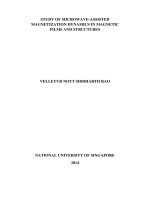- Trang chủ >>
- Cao đẳng - Đại học >>
- Luật
The Changing Law of the Employment Relationship Studies in Modern Law and Policy Series
Bạn đang xem bản rút gọn của tài liệu. Xem và tải ngay bản đầy đủ của tài liệu tại đây (992.02 KB, 274 trang )
THE CHANGING LAW OF THE EMPLOYMENT
RELATIONSHIP
This page intentionally left blank
The Changing Law of the
Employment Relationship
Comparative Analyses in the European Context
NICOLA COUNTOURIS
University of Reading, UK
© Nicola Countouris 2007
All rights reserved. No part of this publication may be reproduced, stored in a retrieval system or transmitted in any form or by any means, electronic, mechanical,
photocopying, recording or otherwise without the prior permission of the publisher.
Nicola Countouris has asserted his moral right under the Copyright, Designs and
Patents Act, 1988, to be identified as the author of this work.
Published by
Ashgate Publishing Limited
Gower House
Croft Road
Aldershot
Hampshire GU11 3HR
England
Ashgate Publishing Company
Suite 420
101 Cherry Street
Burlington, VT 05401-4405
USA
Ashgate website:
British Library Cataloguing in Publication Data
Countouris, Nicola, 1975The changing law of the employment relationship:
comparative analyses in the European context
1. Labor laws and legislation - Europe
I. Title
344.4'01
Library of Congress Cataloging-in-Publication Data
Countouris, Nicola, 1975The changing law of the employment relationship : comparative analyses in the
European context / by Nicola Countouris.
p. cm. -- (Studies in modern law and policy series)
Includes bibliographical references and index.
ISBN 978-0-7546-4800-0
1. Labor laws and legislation--Europe. 2. Personnel management--Europe. I.
Title.
KJC2855.C68 2007
344.401--dc22
2007009692
ISBN 978-0-7546-4800-0
Printed and bound in Great Britain by Antony Rowe Ltd, Chippenham, Wiltshire.
Contents
Table of Cases
Table of Legislation
Preface
List of Abbreviations
vii
xi
xix
xxi
Introduction
1. The aims of the book
2. Scope and methodology
3. Structure and summary of the book
1
1
2
12
1
2
3
The Employment Relationship and the Contract of Employment
in Industrialised Societies
1. Introduction
2. The industrial revolution and the birth of the contract of
employment
3. The unitary notion of contract of employment
4. The breakdown of the employment relationship
5. The contractual dimensions of the employment relationship
6. Conclusions
Reshaping the Personal Scope of LabourLaw: An Analysis of
Current Debates in Europe
1. Introduction
2. Stretching the notion of ‘employee’
3. The debate over the ‘grey zone’ between employment
and self-employment
4. Re-targeting labour law
5. Conclusions
Atypical Employment Relationships: A Comparative Analysis of
Fixed-term, Part-time and Temporary Agency Work in Europe
1. Introduction
2. Early legislation and the status of atypical workers
3. Regulation and unemployment: typical rights for atypical
workers
4. Flexibility and special rights for ‘more and better’ atypical jobs
in the 1990s: from social stability to social acceptance and
normalisation?
5. Conclusions
15
15
16
25
40
53
55
57
57
58
71
81
83
87
87
89
105
121
141
The Changing Law of the Employment Relationship
vi
4
5
6
The ILO Notion of the Worker and the Scope of the Employment
Relationship
1. Introduction
2. The personal scope of application of ILO instruments
3. The ILO regulatory instruments on atypical work
4. The ILO initiative on the scope of the employment relationship
5. Conclusions
The Personal Scope of Application of EC Social Legislation
1. Introduction
2. The personal scope of application of EC social and employment
law
3. The directions of development of EC law
4. Conclusions: a theoretical structure for the personal scope of
EC social and employment law
147
147
147
154
161
168
171
172
191
197
EC Regulation of Atypical Forms of Work – Between Employment
Law and Employment Policy
205
1. Introduction
2. EC legislative measures on atypical work
207
3. The EU notions of ‘flexibility’, ‘security’ and ‘flexicurity’
211
4. Looking at the national employment policies through the
distorting mirror of National Action Plans and
Employment Recommendations
220
5. Divergences between EES and EC employment law on
atypical work and the European Court of Justice
227
Conclusions
231
Bibliography
Index
237
247
Table of Cases
European Court of Justice
Alphabetical list
Barber v Guardian Royal Exchange (Case C-262/88 ) [1990]
ECR I-1889
291
Bestuur van de Sociale Verzekeringsbank v M. G. J. Kits van Heijningen
(Case C-2/89) [1990] ECR I-1755
287
Bettray v. Staatssecretaris van Justitie (Case 344/87) [1989] ECR 1621
[1991] 1 CMLR
280, 312
Bilka-Kaufhaus Gmbh v. Weber von Hartz (Case 170/84 ) [1986] ECR
1607
174, 290
C.P.M. Meeusen v. Hoofddirectie van de Informatie Beheer Groep
(Case C-337/97) [1999] ECR I-3289 [2000] 2 CMLR 667
278, 311, 313
Criminal Proceedings against Carra and others (Case C-258/98)
[2000] ECR I-4217 [2002] 4 CMLR 9
195
Debra Allonby v Accrington & Rossendale College and others
(Case C-256/01) (Judgement of 13 January 2004) 91, 216, 217, 292-295, 315, 360
Defrenne v Sabena (Case 149/77) [1978] ECR 1365 315
Deutsche Post AG v Elisabeth Sievers and Brunhilde Schrage
(Joined cases C-270/97 and C-271/97) [2000] ECR I 929
315
E.C. Commission v. Belgium (Re Access to Special Employment
Programmes) (C-278/94) [1996] ECR I-4307
312
EJM de Jaeck v Staatssecretaris van Financiën (Case C-340/94)
[1997] ECR I-00461
287, 314
Foreningen af Arbejdsledere i Danmark v A/S Danmols Inventar
(Case 105/84) [1985] ECR 2639
303, 306, 318
Galinsky v Insurance Office (Case 99/80) [1981] ECR 941
287
Gerster v Freistaat Bayern (Case C-1/95) [1997] ECR I-5253 [1998]
1 CMLR 303
176
Hoekstra (née Unger) v Bestuur der Bedrijfsvereniging voor
Detailhandel en Ambachten (Case 75/63) [1964] ECR 177
277, 287, 314
Inge Nolte v Landesversicherungsanstalt Hannover (Case C-317/93)
[1995] ECR I-4625
155
Jenkins v Kingsgate (Case 96/80) [1981] ECR 911
290
Job Centre Coop arl (Case C-55/96) [1997] ECR I-7119 [1998]
4 CMLR 708.
195
Jyri Lehtonen and Another v. FRBSB (Case C-176/96) [2000]
ECR I-2681 [2000] 3 CMLR 409
281
viii
The Changing Law of the Employment Relationship
Klaus Höfner and Fritz Elser v Macrotron GmbH (Case C-41/90)
[1991] ECR I 1979 [1993] 4 CMLR 306
195
Kording v Senator für Finanzen (Case C-100/95) [1997]
ECR I-5289 [1998] 1 CMLR 395
173, 176
Kowalska v Freie und Hansestadt Hamburg (Case 33/89 ) [1990]
ECR I-2591
174, 290
Lawrie-Blum v. Land Baden-Württemberg (Case 66/85) [1986]
ECR 2121 [1987] 3 CMLR 414
278, 312
Levin v. Secretary of State for Justice (Case 53/81) [1982] ECR 1035
[1982] 2 CMLR 467
277, 278, 311, 312
Martίnez Sala v. Freistat Bayern (Case C-85/96) [1998] ECR
I-2691
281, 312
Mary Carpenter v Secretary of State for the Home Department
(C-60/00) [2002] ECR I 6279
313
P. v S. and Cornwall County Council (Case C-13/94) [1996] ECR
I-2143
315
R v Secretary for Trade and Industry ex parte Broadcasting,
Entertainment, Cinematographic and Theatre Union (BECTU)
(Case C-173/99) [2001] ECR I- 4881
299, 300
R v Secretary of State, ex p Seymour-Smith and Perez (Case C-167/97)
[1999] ECR I-623 [1999] 2 CMLR 322
152, 189, 190, 290
Raulin v. Minister van Onderwijs en Wetenschappen (Case C-357/89)
[1992] ECR I-1027 [1994] 1 CMLR 227
279, 312, 295
Razzouk and Beydoun v Commission (Joined Cases 75/82 and 117/82)
[1984] ECR 1509
315
Reinhard Gebhard v Consiglio dell’Ordine degli Avvocati e Procuratori
di Milano (Case C-55/94) [1995] ECR I-4165
282, 283
Rinner-Kuhn (Case 171/88) [1989] ECR 2743
174, 290
Secretary of State for the Home Department v Hacene Akrich
(Case C-109/01) [2003] ECR 0
313
Shirley Preston and Others v Wolverhampton Healthcare NHS Trust
and Others (Case C-78/98) [2000] ECR I-3201
115, 116, 290-292, 315
Steymann v. Staatssecrretaris van Justitie (Case 196/87) [1988]
ECR 6159 [1989] 1 CMLR 449
280, 312
Union Royale Belge des Sociétés de Football Association (ASBL) v.
Bosman Case (C-415/93) [1995] ECR I-4921 [1996] 1 CMLR 645
281
United Kingdom
Alphabetical list
BBC v Ioannou [1975] ICR 267
151
BBC v Kelly-Phillips [1998] ICR 587 [1998] IRLR 294
151
Carmichael v National Power plc [1999] ICR 1226 83, 85, 105, 114, 116, 139, 295
Clarke v. Powell and Eley (IMI) Kynoch Ltd [1982] IRLR 131
180
Table of Cases
ix
Cloroll Pension Trustees Ltd v Russell [1994] IRLR 586
180
Clymo v Wandsworth Borough Council [1989] IRLR 241
179
Construction Industry Training Board v Labour Force Ltd (1970)
3 All ER 220
66, 168
Dacas v Brooks Street Bureau (UK) Ltd [2003] IRLR 190
166, 167
Debra Allonby v Accrington & Rossendale College [2001] IRLR 354
217
Devonald v Rosser & Sons Ltd [1906] 2 KB 728
46
Emmens v Eldertonn (1853) 13 CB 495
36
England v The Governing Body of Turnford School [2003] WL 21047416
207
Franks v Reuters Ltd [2003] IRLR 423
167, 168
Hall v Lorimer [1994] ICR 218
103
Hanley v Pease & Partners [1915] 1 KB 698
46
Hewlett Packard v. O’Murphy [2002] IRLR 4
168
Home Office v Holmes [1984] IRLR 299
179, 180
Ironmonger v. Movefield Ltd t/a Deerings Appointments [1988]
IRLR 461 (EAT)
90, 162, 168
Kidd v. DRG (UK) Ltd [1985] IRLR 190
180
Lancaster v Greaves (1829) 9 B & C 627.
36
Lane v Shire Roofing Company (Oxford) Ltd [1995] IRLR 493 (CA)
102
Market Investigations Ltd v Minister of Social Security [1969] 2 QB 173
57
McMeechan v Secretary of State for Employment [1995] ICR 444 [1995]
IRLR 461
66, 162, 165
Montgomery v Johnson Underwood Ltd [2001] ICR 819
IRLR 269
90, 162, 165, 166, 170
Montreal v Monteral Locomotive Works [1947] 1 DLR 161
57, 102, 103
Morren v Swinton and Pedelebury Borough Council [1965] 1 WLR 576
55
Motorola Ltd v Davidson [2001] IRLR. 4
165
O’Kelly v Trusthouse Forte Plc [1983] ICR 728 [1984]
QB 90
83, 103, 105, 114, 116, 132, 139, 295
O’Sullivan v Thompson-Coon (1972) 14 KIR 108
66, 164
Preston v Wolverhampton Healthcare NHS Trust [2001] UKHL 5 (2001),
[2001] ICR. 217
115, 116
R v Secretary of State, ex p Seymour-Smith and Perez. [1994] IRLR 448
[1995] IRLR 464, CA [1997] IRLR 315 HL
152, 189, 190
Ready Mixed Concrete (South East) Ltd v Minister of Pensions and
National Insurance [1968] 2 QB 497
55, 103
Simmons v Heath Laundry Co [1910] 1 KB 543
45
Simpson v. Ebbw Vale Steel, Iron & Coal Co. [1905] 1 KB 453
40
Staffordshire County Council v Black [1995] IRLR 234
180
Stevenson, Jordan & Harrison v MacDonald & Evans [1952] 1 TLR 101
56
Underwood v Perry [1932] W.C. & I. Rep. 63
45
Wickens v Champion Employment [1984] ICR 365
162, 165
Yewens v Noakes (1880) 6 QBD 530
54
x
The Changing Law of the Employment Relationship
France
Chronological order
Civ 6 juillet 1931 (arrêt Bartdou ) DP 1931. 1. 121
Cass Ass Plén 18 juin 1976 Dalloz 1977 J 173
Cass Soc 29 juin 1977 Dalloz 1977 IR 359.
Cass Soc 7 décembre 1983 Bull Civ V n 592
Cass Soc 6 juin 1991 RJS 7/91 n 817
Cass Soc 7 juillet 1998 RJS 10/98 n 1311
Cass 14 mai 1999 Bull Civ V n 174
Cass Soc 19 décembre 2000 Dalloz 2001 IR 355
Cass. 4 décembre 2001 Dalloz 2002 JC 1934
55
100
64
101
224
215
107
56, 138
138
Italy
Chronological order
C. Cost. 20 Maggio 1976 n 117 Rep Corte Cost 1976 1646
Cass. 14 Giugno 1979 n 3353 Giustizia Civile 1979 1462
Cass. 7 Aprile 1992 n 4220 Giustizia Civile 1992 559
Cass. 1 Ottobre 1997 n 9606 Giustizia Civile 1997 1835
Cass. 6 Maggio 1999 n 4558 Giustizia Civile 1999 1030
Cass. 22 Novembre 1999 n 12926 Giustizia Civile 2000 2319
Cass. 23 Febbraio 2000 n 2039 Giustizia Civile 2000 2319
Cass. 18 Novembre 2000 n 1924 Giustizia Civile 2000 416
Cass. 06 Luglio 2001 n 9167 RIDL 2002 II 272.
Cass. 27 Novembre 2002 n 16805 Giustizia Civile 2002 16805
Cass. 27 Febbraio 2003 n. 3020 Giustizia Civile 2003 410
Cass. 9 Marzo 2004 n. 4797 Giustizia Civile 2004 3
Cass. 18 Marzo 2004 n. 5508 Giustizia Civile 2004 3
61
113
113
113
113
117
117
117
105
105
169
63
63
Germany
Chronological order
BAG 1976, AP, n 2 sub sec. 62 BAT
BAG 1982, AP, n 1 sub sec. 1 BetrAVG
LAG Niedersachsen 6 Sept 1989 LAGE § 611 BGB Arbeitnehmerbegriff
Nr 24
LAG Köln 30 June 1995 LAGE § 611 BGB Arbeitnehmerbegriff Nr 27 110
174
174
110
Table of Legislation
Treaty Provisions
Article 2
Article 3
Article 13
Article 43
Article 49
Article 138
Article 141 (ex Article 119)
316
316
316
281
281,282
308
288,290,291,292,294,315 (155, 189, 288, 289, 315)
Council legislation
Regulations
Regulation 3/58 [1958] JO 561
Regulation 4/58 [1958] JO 597
Regulation 1612/68 [1968] OJ Spec. Ed. L257/2
Regulation 1408/71[1971] OJ L149/2
Regulation 1390/81 [1981] OJ L143/1
285
285
281
286
286
Directives
Directive 75/117/EEC [1975] OJ L45/19
289
Directive 75/129/EEC [1975] OJ L48/29
318
Directive 76/207/ EEC [1976 OJ L39/40
289
Directive 77/187/EEC [1977] OJ L61/26
79, 301, 304, 306
Directive 77/576/EEC [1977] OJ L229/12
317
Directive 80/987/EEC [1980] OJ L283/23
318
Directive 86/613/EEC [1986] OJ L 359/56
289, 296
Directive 90/365/EEC [1990] OJ L180/26
313
Directive 91/383/EEC [1991] OJ L206/19
164, 298, 305, 327, 328
Directive 91/533/EEC [1991] OJ L288/32
300, 320
Directive 93/104/EEC [1993] OJ L307/18
299
Directive 96/71/EEC [1997] OJ L18/1
284
Directive 97/81/EC as amended by Dir 98/23/EC [1998]
OJ L131/10 consolidated [1998] OJ
L131/13
202, 210, 302, 324, 325, 329, 330, 342
Directive 98/50/EEC [1998] OJ L201/98
301, 304, 321
xii
The Changing Law of the Employment Relationship
Directive 99/70 [1999] OJ L175/43
146, 182, 185, 188, 190, 217, 217, 302, 324,
325, 329, 330, 339
Directive 2000/43/EC [2000] OJ L 180/22
296, 316
Directive 2000/78/EC [2000] OJ L 303/16
296, 316
Decisions and Resolutions
Council Resolution of 15 December 1997 on the 1998
Employment Guidelines [1998] OJ C 30/1
335, 336
Council Resolution of 22 February 1999 on the 1999 Employment
Guidelines [1999] OJ C 69/2
316, 339
Council Decision of 19 January 2001on Guidelines for Member States’
employment policies for the year 2001 [2001] OJ L 22/18
337
Council Decision of 18 February 2002 on Guidelines for Member States’
employment policies for the year 2002 [2002] OJ L 60/67
337
Council Decision of 22 July 2003 on Guidelines for the employment
policies of the Member States [2003] OJ L 197/17
337, 338
Recommendations and Declaration
Declaration of Council accompanying Directive 68/360 [1968] OJ
Spec. Ed. L257/13 Council
Recommendation of 19 January 2001 on the implementation of
Member States’ employment policies [2001] OJ L 22/33
Council Recommendation of 18 February 2002 on the implementation
of Member States’ employment policies [2002] OJ L 60/70
Council Recommendation of 22 July 2003 on the implementation
of Member States’ employment policies [2003] OJ L 197/26
281
337, 344
345, 346
349
COMMISSION (various)
Communication from the Commission Concerning its Action
Programme relating to the Implementation of the Community
Charter of Basic Social Rights for Workers COM(89) 568 final
326-328
Commission Proposal for a Council Directive on certain employment
relationships with regard to working conditions COM(90) 228 final
[1990] OJ C 224/04
298, 327
Commission Proposal for a Council Directive on the Approximation
of Laws of the Member States Relating to Certain Employment
Relationships with Regard to Distortions of Competition COM(90)
228 final [1990] OJ C 224/06
298, 327
EC Commission Green paper – Partnership for a new organisation
of work COM (97) 128 final 16.4.1997
333, 334, 337
EC Commission Communication Modernising the Organisation of
Table of Legislation
xiii
work – A positive approach to change COM(98) 592 final 12.10.1998
334, 336
Commission Proposal for a Directive of the European Parliament
and the Council on working conditions for temporary workers
COM (2002) 0149 final [2002] OJ C 203/1
226, 324, 331, 332
Amended proposal for a Directive of the European Parliament
and the Council on working conditions for temporary workers COM (2002)
701final 28.11.02.
324, 331, 332
ECOSOC (opinions)
Opinion of the Economic and Social Committee on the ‘Proposal
for a Directive of the European Parliament and the Council on
working conditions for temporary workers’ [2003] OJ C 61/124, 126
340
International Labour Organization
Conventions
ILO Convention C1: Hours of Work (Industry) Convention
243
ILO Convention C2: Unemployment Convention
244
ILO Convention C3: Maternity Protection Convention
244
ILO Convention C4: Night Work (Women) Convention
244
ILO Convention C26: Minimum Wage-fixing Machinery Convention
244, 245
ILO Convention C30: Hours of Work (Commerce and Offices) Convention
245
ILO Convention C87: Freedom of Association and Protection of
the Right to Organize Convention
245, 246
ILO Convention C95: Protection of Wages Convention
246
ILO Convention C97: Migration for Employment Convention
247
ILO Convention C98: Right to Organize and Collective Bargaining
Convention
245
ILO Convention C102: Social Security (Minimum Standards)
Convention
248, 247, 273
ILO Convention C103: Maternity Protection Convention
245
ILO Convention C111: Discrimination (Employment and Occupation)
Convention
257
ILO Convention C132: Holidays with Pay Convention
246
ILO Convention C153: Hours of Work and Rest Periods
(Road Transport) Convention
248
ILO Convention C154: Collective Bargaining Convention
249
ILO Convention C155: Occupational Safety and Health Convention
249
ILO Convention C156: Workers with Family Responsibilities Convention
249
ILO Convention C158: Termination of Employment Convention
249, 250
ILO Convention C172: Working Conditions (Hotels and Restaurants)
Convention
250
xiv
The Changing Law of the Employment Relationship
ILO Convention C175: Part-Time Work Convention
254
ILO Convention C177: Home Work Convention
251, 258
ILO Convention C181: Private Employment Agencies Convention
89, 161, 258,
259, 260, 264, 272,
ILO Convention C183: Maternity Protection Convention
252, 256
National Legislation
United Kingdom
Combination Act 1824
34
Conduct of Employment Agencies and Employment Businesses
Regulations1976
162
Conspiracy and Protection of Property Act 1875
36
Contracts of Employment Act 1963
50
Control of Employment Act 1939
65
Defence of the Realm Act 1915
65
Disability Discrimination Act 1995
130
Employer’s Liability Act 1880
40
Employers and Workmen Act 1875
36, 46
Employment Agencies Act 1973 (as amended by the Employment
Protection Act 1975 and the Deregulation and Contracting Out Act 1994)
161
Employment Equality (Religion or Belief) Regulations 2003
130
Employment Equality (Sexual Orientation) Regulations 2003
130
Employment Protection Act (EPA)1975
161, 178
Employment Relations Act (ERA) 1999
169
Equal Pay Act (EqPA)1970
130, 291
Fixed-term Employees (Prevention of Less Favourable Treatment)
Regulations 2002
220-221, 225
Health and Safety at Work Act 1974
129, 164
Master and Servant Act of 1867
35
Master and Servant Acts 1747
35
Master and Servant Acts 1766
35
Master and Servant Acts 1823
35
Maternity and Parental Leave etc Regulation 1999
152
National Insurance Act 1946
48
National Minimum Wage Act (NMWA) 1998
13, 131, 169, 263
Part-time Work (Prevention of Less Favourable Treatment)
Regulations 2000
204-208, 210-212
Race Relations Act 1976
130
Sex Discrimination Act (SDA) 1975
130, 179
Statute of Artificers 1563
31, 35
Statute of Labourers 1349
31, 35
Statute of Labourers 1351
31, 35
Trade Dispute Act 1906
46
Table of Legislation
xv
Trade Union and Labour Relations (Consolidation) Act (TULR(C)A) 1992
130
Trade Union Reform and Employment Rights Act (TURERA) 1993
151
Working Time Regulations (WTR) 1998
131, 169, 299
Workmen’s Compensation Act 1897
40
Workmen’s Compensation Act 1906
44, 45
France
Code du Travail
Art L
para. 121.5
para. 122.1. al.1
para. 122.1.1
para. 122.1.2
para. 122.1.3
para. 122.2
para. 122.2.1
para. 122.3
para. 122.3.1
para. 122.3.2
para. 122.3.3
para. 122.3.4
para. 122.3.8
para. 122.3.11 al. 2
para. 122.3.11 al. 3
para. 122.3.11.
para. 122.3.13
para. 122.3.17.1
para. 122.4.3 al. 2
para. 122.4.3 al. 3
para. 122.4.4
para. 124.2.2, al. 2
para. 124.2.2, al. 3
para. 124.4.2
para. 124.4.3
para. 125.1
para. 125.3
para. 212.4
para. 212.4.2
para. 212.4.2, al. 5.
para. 212.4.3
para. 212.4.3 al. 6.
para. 212.4.4
para. 212.4.5
para. 212.4.5 al. 7.
151
183
181, 220
181, 183, 184, 223
181
159, 181, 192, 221
183
182
181
181
184
181, 225, 184
225
183
183
183, 223
184
221, 224
173
173
194
192
192
191, 193
193
50, 65
65
202, 208
172, 203
172
154, 172, 214, 215
216
215
202
173
xvi
The Changing Law of the Employment Relationship
para. 212.4.6
para. 212.4.7
para. 212.4.9
para. 351.1
para. 721.1
para. 721.6
para. 751.1
para. 761.2
para. 762.1
para. 763.1
para. 773.1
para. 781.1
para. 782.1
para. 931.8.2
para. 931.12
Code Civil Art 1780
Code Civil Art 1781
Loi 2-17 mars 1791 (décret d’Allarde)
Loi du 9 avril 1889
Loi du 9 avril 1908
Loi du 5 avril 1910
Loi n 72-1 du 3 janvier 1972
Loi n 73-680 du 13 juillet 1973
Loi n 79-11 du 3 janvier 1979
Loi n 81-64 du 28 janvier 1981
Ordonnance n 82-130 du 5 février 1982
Ordonnance n 82-272 du 26 mars 1982(Auroux reforms)
décret du 3 avril 1985 n 85-399
Loi n 85-772 du 25 juillet 1985
Ordonnance n 86-948 du 11 août 1986
Loi n 90-613 du 12 juillet 1990
Loi n 92-1446 du 31 décembre 1992
Loi quinquennale n 93-1313 du 20 décembre 1993
Loi n 98-461 du 13 juin 1998 (Aubry)
Loi n 2000-37 du 19 janvier 2000 (Aubry II)
Loi n 2002-73 du 17 janvier 2002
215
209
209
184, 226
106
106
106, 137
107, 137
107, 137
107, 137
106
106, 137
106
213
225
38
38
33, 37
40
47
47
159, 191, 192
50
73, 150, 153
171-173
151, 159, 173
74, 153, 173
181
181, 191
181, 191, 192
182
202
154, 202
153, 203, 214
153, 203, 214, 215
221
Italy
Civil Code of 1865 Articolo 1627 n1
Civil Code of 1865 Articolo 1628
Codice Civile Articolo 2094
39
38
120
Table of Legislation
xvii
Codice Civile Articolo 2224
120
Codice di Procedura Civile Article 409(3)
119, 125
Legge 5 giugno 1893 n 215
Regio Decreto Legge n 1825 del 1924
Legge 13 marzo 1958 n 264
Legge 23 ottobre 1960 n 1369
Legge 18 aprile 1962 n 230
Legge 20 maggio del 1970 n 300 (Statuto dei Lavoratori)
Legge 11 agosto 1973 n 533
Legge 18 dicembre 1973 n 877
Legge 19 dicembre 1984 n 863
Legge 28 febbraio 1987 n 56
Legge 8 agosto 1995 n 335
Legge 24 giugno 1997 n 196
Decreto Legislativo 25 febbraio 2000 n 61.
Decreto Legislativo 6 settembre 2001 n 368
Decreto legge 30 settembre 2003 n 269
Decreto Legislativo 10 settembre 2003 n 276
42
60
57, 81
50, 65, 67, 230
148, 185
50, 178
119
57, 81
156, 171, 176
186
129
160, 197-199
208, 208, 214
185, 219, 220, 222, 225
129
108, 124-128, 230-234
Germany
Weimar Constitution Article 157
Gesetz zu Korrekturen in der Sozialversicherung und
zur Sicherung der Arbeitnehmerrechte’ (BGBI. I S. 3843, v art 3,
modifying § 7 of book IV of the Social Security Code)
Sozialgesetzbuch Sections 7 Sozialgesetzbuch-SGB, § 7
60
107
108, 119
1924 White-Collar Workers’ Social Insurance Act
60
1963 Bundesurlaubsgesetz
119
1985 Beschäftigungsförderungsgesetz (The 1985 Law on
Improvement of Employment Opportunities)
73, 155,
1972 Arbeitnehmeruberlassungsgesetz
50, 158
1974 Tarifsvertragsgesetz (law on collective agreements)
118
1994 Arbeitsgerichsgesetz
118
1999 Gesetz zur Förderung der Selbständigkeit ( Law on the
promotion of self-employed work)
108, 129
2001 Teilzeit – und Befristungsgesetz (TzBfG)
202, 208-210, 213, 221, 225
Law 23 December 2002
108
2002 Law on ‘Modern services on the labour market’
195, 228-230
This page intentionally left blank
Preface
This book presents a comparative analysis of the changing legal notions of the
employment relationship in four European countries – the UK, Germany, France
and Italy. It analyses the ways in which, during the past few decades, industrialised
countries have witnessed a progressive crisis of the regulatory framework sustaining
the binary model of the employment relationship based on the subordinate
employment/autonomous self-employment dichotomy. New atypical and hybrid
working arrangements have emerged, challenging the traditional notions of, and
divisions between, autonomy and subordination. This in turn has strained labour law
systems across industrialised countries that were previously based on the notion of
dependent and subordinate employment to cast their personal scope of application
triggering a de-regulatory dynamic that some Italian scholars have described as la
fuga dal diritto del lavoro. Legal systems, at a national and supranational level, are
constantly trying to catch up with these changes, and the core of the present work
closely scrutinises the extent of their successes or failures.
The book is written at a time where no single solution to the problems being
analysed has emerged, and in that respect it is very much a product of its time.
It presents the various re-regulatory approaches currently being developed and
argues that a new dynamic equilibrium can be achieved by using a mix of regulatory
techniques and approaches aiming at expanding the legal notion of the employment
relationship and at providing ad hoc regulation for a number of atypical forms of work.
One of the major challenges in completing the present work has been to keep abreast
of the constantly evolving legal framework at a national and supranational level. For
a number of obvious and less obvious reasons, I have often had to take the difficult
decision of leaving outside the scope of this book a number of legal developments
that, according to my perhaps unwise judgment, were not strictly necessary to the
substance and structure of the book. The work seeks to state the law as it stood on
31 November 2006, although one or two subsequent legal developments have been
included at proof stage.
One of the first seminars on research method I attended whilst a young doctoral
student at St Edmund Hall, Oxford, provided me with the rather daunting warning
that ‘research is essentially a solitary vocation’. It is with great relief that, a few
years down the line, I can happily assert that this is perhaps the only foundational
lesson I have been imparted during my DPhil years that I have found not to be
entirely true. Surely enough the present work is the product of numerous hours spent
researching and studying in the Bodleian Law Library and organising, shaping and
re-shaping arguments, ideas and draft chapters, constantly tormented by the thought
of modifying them again and again. But nowhere during this thrilling journey have I
felt the slightest sign of intellectual or existential solitude.
I have no doubt whatsoever that the greatest credit for that must go to Professor
Mark R. Freedland, who as a supervisor first and, more recently, as a senior colleague,
xx
The Changing Law of the Employment Relationship
has constantly inspired me with an unparalleled wealth of mind-blowing suggestions,
comments and ideas. I am particularly grateful to him for introducing me to this
constantly changing and challenging area of employment law and for making me
realise the importance, and the limits, of comparative analysis in approaching the
study of the employment relationship. I am also very grateful to Dr Anne Davies,
Professor Simon Deakin and Professor Sandy Fredman for their precious comments
and feedback on earlier drafts of this work. I have also benefited greatly from
discussion, general and particular, with Dr Alexandra Braun, Professor Damian
Chalmers, Professor Chris Hilson, Miss Rachel Horton, Dr Catherine Jacqueson, Dr
Grace James, Miss Isobel Renzulli, and Professor Derrick Wyatt and I thank them
for their genuine and generous support. I am in no doubt that both the process and,
hopefully, the outcome of the present work have also greatly benefited from the
possibility of sharing some of its central ideas during conferences and workshops
with other distinguished colleagues inside and outside the United Kingdom. In this
respect my gratitude goes to Dr Giuseppe Casale, Professors Hugh Collins, Professors
Judy Fudge and Mario Giovanni Garofalo, Dr Claire Kilpatrick, and Professors Alan
Neal, Silvana Sciarra and Aurora Vimercati. I am aware that I owe a great debt of
gratefulness to a number of institutions that, in different ways, have supported me
whilst working on this book, and in particular to St Edmund Hall and St John’s
College, the University of Oxford, the Arts and Humanities Research Board and
the University of Reading. And I am also conscious that the work as such would
have probably never appeared had it not been for the support and comfort offered
by good friends and relatives, and in particular by Ida Liuni, Antonios Kountouris,
Teresa d’Aloya, Giacomo Tortora, Laura Bradley, Philip Barfred, Yonatan Witztum,
Harrys Papadopoulos, Alexandros Tsadiras and, dulcis in fundo, by my partner
Isobel Renzulli. Last but not least, my gratitude goes to those who have interacted,
in various capacities, with the extremely efficient editorial machinery of Ashgate
Publishing. I am particularly grateful to the two earnest and perceptive anonymous
referees, to the series editor Professor Ralph Rogowski and to the ever so kind,
helpful and painstakingly meticulous Mrs Alison Kirk and Emily Gibson.
It goes without saying that while all the aforementioned colleagues, friends and
institutions deserve credit for disproving the dictum that ‘research is essentially a
solitary vocation’ none of them bears any responsibility whatsoever for the – no
doubt several – shortcomings of this work.
Nicola Countouris
Oxford, 10 April 2007
Abbreviations
AG
All ER
BAG
BCLR
C Cost
CA
Cas Soc
Cass
CB
CBR
CEEP
CGIL
CISL
CLLJ
CML Rev
CMLR
CSDLE
DG
DS
DTI
EAT
EC
ECJ
ECOSOC
ECR
ECT
EEC
EES
EIRO
EIRR
EPA
EqPA
ESCR
ESF
ETUC
EU
GB
GDLRI
GU
Advocate General
All England Law Reports
Bundesarbeitsgericht
Bulletin of Comparative Labour Relations
Corte Costituzionale
Court of Appeal
Cour de Cassation Chambre Sociale
Corte di Cassazione
Common Bench Reports
Centre for Business Performance
Centre Européen d’entreprise publique
Confederazione Generale Italiana del Lavoro
Confedereazione Italiana Sindacati Liberi
Comparative Labor Law Journal
Common Market Law Review
Common Market Law Reports
Centro Studi di Diritto del Lavoro Europeo
Directorate General (of the European Commission)
Droit Social
Department of Trade and Industry
Employment Appeal Tribunal
European Community
European Court of Justice
European Economic and Social Committee
European Court Reports
European Community Treaty
European Economic Community
European Employment Strategy
European Industrial Relations Observatory
European Industrial Relations Review
Employment Protection Act
Equal Pay Act
Economics and Social Research Council
European Social Fund
European Trade Union Congress
European Union
Governing Body (of the ILO)
Giornale di Diritto del Lavoro e Relazioni Industriali
Gazzetta Ufficiale della Repubblica Italiana
xxii
HL
H&S
ICR
IJCLLIR
ILJ
ILO
ILR
IR
IRES
IRLR
ITR
JCMS
JER
KB
KIR
LAG
LQR
MLR
NAP
NIDIL
OJ
OUP
QB
RGL
RIDL
RRA
SDA
TULR(C)A
TURERA
UIL
UK
UNICE
WLR
The Changing Law of the Employment Relationship
House of Lords
Health and Safety
Industrial Court Reports (1972-74) Industrial Cases Reports (1975-)
International Journal of Comparative Labour Law and Industrial
Relations
Industrial Law Journal
International Labour Organisation
International Labour Review
Information Rapides
Istituto di Ricerche Economiche e Sociali
Industrial Relations Law Reports
Industrial Tribunal Reports
Journal of Common Market Studies
Joint Employment Report
King’s Bench
Knight’s Industrial Reports
Landes-Arbeitsgericht
Law Quarterly Review
Modern Law Review
National Action Plan
Nuove Identitá di lavoro
Official Journal
Oxford University Press
Queen’s Bench
Rivista Giuridica del Lavoro e della Previdenza Sociale
Rivista Italiana di Diritto del Lavoro
Race Relations Act
Sex Discrimination Act
Trade Union and Labour Relations (Consolidation) Act
Trade Union Reform and Employment Rights Act
Unione Italiana del Lavoro
United Kingdom of Great Britain and Northern Ireland
Union of Industrial and Employers’ Confederations of Europe
Weekly Law Reports
Introduction
1. The aims of the book
The individual employment relationship is increasingly under the scrutiny of labour
lawyers, judiciaries, law and policy makers. The relevance of this kind of scrutiny is
obvious to any legally minded observer. Since 20th century employment protection
systems have developed by using the notion of ‘standard employment relationship’
as a cast to shape their personal scope of application, any changes affecting the
employment relationship inevitably reverberate throughout the realm of labour law.
Indeed, British legal scholarship has been at the forefront of the many debates linked
to the study of the individual employment relationship, first and foremost those
related to the individual scope of application of labour law.1 But this type of analysis
is hardly alien to the Continental legal debate2 since in the rest of Europe, just as in
the UK, access to employment rights largely depends on the type of employment
relationship under which a person is engaged.
A number of changes have taken place in the last thirty years or so that have
modified the traditional notions of the employment relationship. The present book
seeks to define the terms of these changes and the ways in which they are affecting
the scope of application of labour legislation. It also explores the ways in which
the various legal systems at a national and supranational level are trying to come
to terms with these changes and what, if anything, is to be learned from the various
regulatory approaches. More precisely, it seeks to provide an analysis of the changes
of the scope and taxonomy of employment relationships in four European Union
(EU) Member States (MSs): the United Kingdom, Germany, France and Italy.
The following introduction lays out the research plan of our investigation. But
before doing this it is important to define and circumscribe the domain, that is to say
the scope, and the method of our enquiry while defining some important terms and
key concepts of the present work.
1 M. Freedland, The Personal Employment Contract (OUP, Oxford, 2003); S. Deakin
and F. Wilkinson, The Law of the Labour Market – Industrialization, Employment and Legal
Evolution (OUP, Oxford, 2005).
2 A. Supiot (ed.), Au delà de l’emploi. Transformations du travail et devenir du droit du
travail en Europe (Flammarion, Paris, 1999); U. Carabelli and B. Veneziani (eds), Du travail
salarié au travail indépendant: permanences et mutations (Cacucci, Bari, 2003).
2
The Changing Law of the Employment Relationship
2. Scope and methodology
The legal dimension of the employment relationship
The nature and notion of the employment relationship have been subject to the
close scrutiny of several distinct disciplines, ranging from law and economics to
industrial relations, social psychology and morals and philosophy.3 There is little
doubt that all these disciplines offer between them a unique prism through which
the nature of the employment relationship can be observed and evaluated. Each
discipline uses different analytical tools and typically focuses on different aspects
of the relationships linking employers and workers. Some disciplines, for instance
economics and human resource management, predominantly focus on what it is
perhaps possible to define as the factual dimension of the employment relationship,
that is to say on decisions and dynamics relating to the ways enterprises formulate
their specifications for acquiring and using labour resources and on the reciprocal
choices made by individuals offering their skills and labour to an employer for a
price, a salary. This dimension has to do with business choices defining the quantities
of labour energies to be purchased, the different types of labour energies that need to
be acquired (in terms of human capital and skills), the use that businesses make of
the labour energies acquired and the temporal patterns of acquisition and use of these
labour energies. And of course it also pertains to the factors shaping the choices of
individual workers in establishing an employment relationship.
The current work will focus centrally upon the legal dimension of the relationship
between workers and employers. By legal dimension it is meant the legal arrangements
into which the aforementioned factual arrangements relating to the purchase, sell,
use and management of labour energies are translated. These legal arrangements
are subject to specific regulatory regimes and our enquiry will exclusively focus on
these regimes. Block, Berg and Belman offer a rather illuminating description of the
distinction between the economic base and the legal structure of the employment
relationship.
Whereas economic theory provides a tool to understand the employment relationship,
the extent to which societies allow market forces to determine or dominate the nature of
the employment relationship is a public policy decision reflected in the laws that govern
employment and labor relations.4
It is precisely on these public policy decisions and, ultimately, on these laws that the
current work seeks to focus its analysis.
There is a lot to say and to research on how the economic system influences
the factual notions of the employment relationship and about the ways the factual
notions concur in shaping the legal notions of the employment relationship. Some
3 For a recent and comprehensive overview of some of the disciplines that have
embarked in the analysis of the employment relationship see J.A.-M. Coyle Shapiro, L.M.
Shore, M.S. Taylor, and L.E. Tetrick (eds), The Employment Relationship – Examining
Psychological and Contextual Perspectives (OUP, Oxford, 2004).
4 R.N. Block, P. Berg and D. Belman in Coyle Shapiro et al., p. 94.









